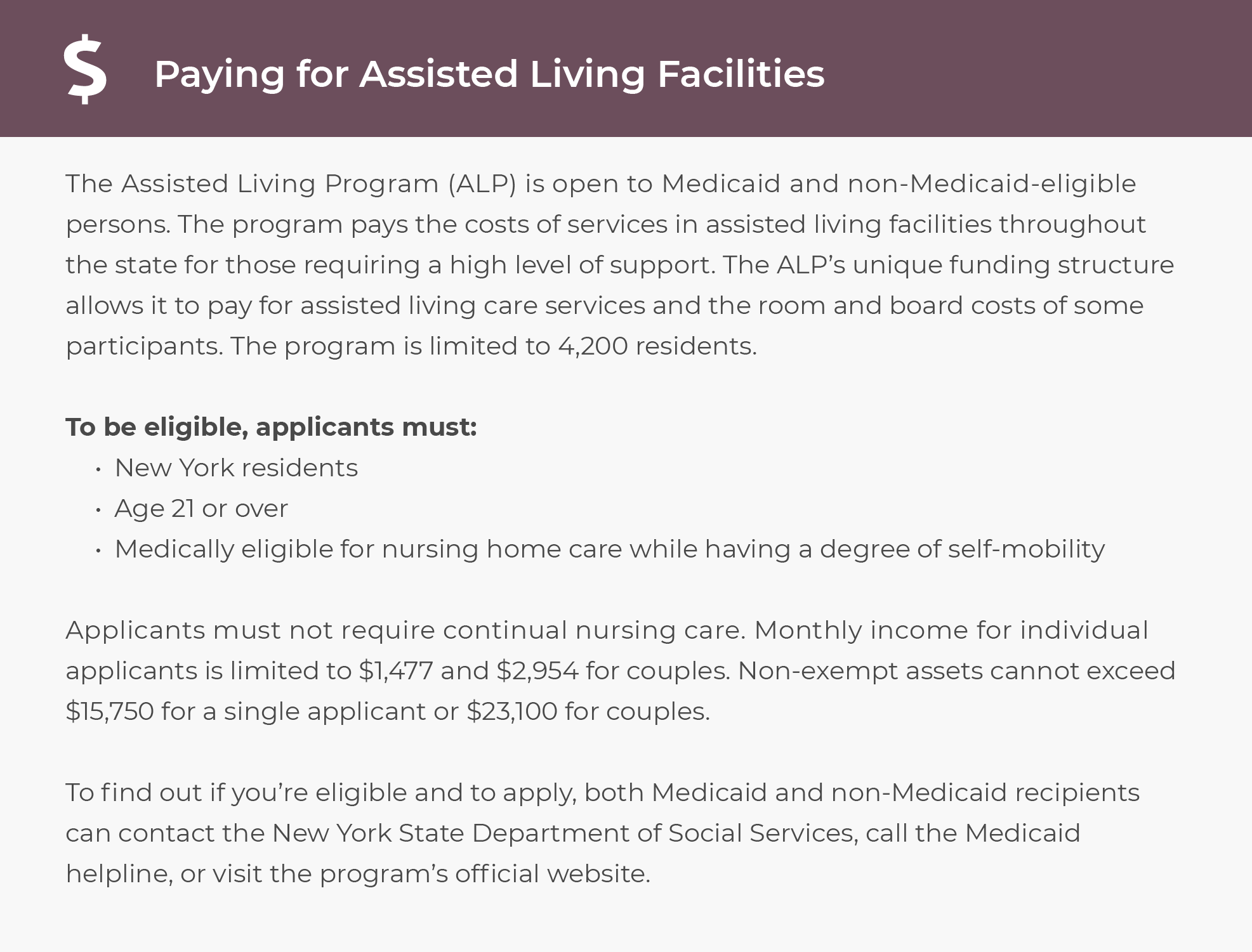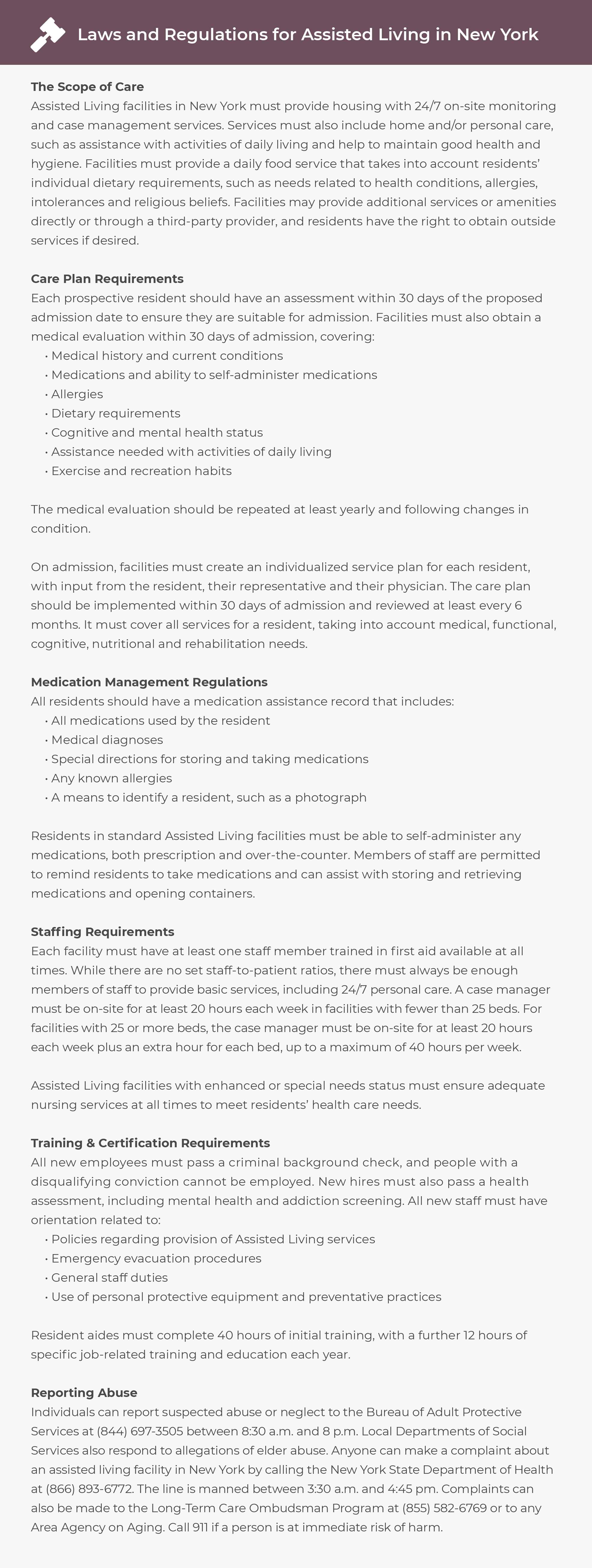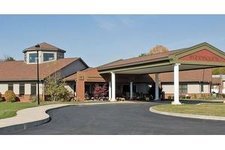Elmira is located in upstate New York and boasts approximately 26,500 residents. The 2020 Census reveals that 13.9% are aged 65+, which is a rate below the national average. The city offers seniors a relatively leisurely pace of life, beautiful scenery and an average cost of living that’s well below normal. It also has lower levels of violent crime, more physicians per capita than the average rate, and excellent air and water quality. Arnot Ogden Medical Center is one of the best hospitals in New York, and Elmira is a member of the AARP Age-Friendly Network.
Assisted living facilities provide nonmedical personal care services for seniors no longer able to live at home without access to 24/7 support. Residents can furnish their rooms with personal items and staff usually take care of cleaning, laundry and linens as well as serve three fresh meals per day. It’s also typical for an assisted living facility to have a nurse on-site 24/7. Costs in Elmira average $5,600 per month, making Elmira more expensive than the state average.
This guide considers the benefits of assisted living in Elmira and compares its costs with some other cities in New York. It also includes some free and low-cost resources for the city’s seniors.
Hundreds of thousands of American seniors utilize assisted living, a figure that is only growing. For these seniors, assisted living combines residential housing,assistance in daily activities, and some healthcare. These communities also strive to provide an atmosphere that is comfortable and engaging for their residents… Read More >
COVID-19 restrictions and rules for Assisted Living Facilities are typically set by the state – to see the rules in your state, you can read our guide to Assisted Living in New York. Keep in mind that there may be other policies that communities put in place to protect their residents, so you should contact your local community for more information. Additionally, you can contact your local Area Agency on Aging to learn more – find contact information here.
Based on an average of 44 hours of care per week, the median fee for assisted living in Elmira is $5,600. However, this fee could be lower or higher depending on multiple factors, including the facility’s individual pricing structure.
When compared to the average New Yorker who pays $4,580, and the average American who pays $4,500, Elmira seniors can expect to pay an additional $1,020 to $1,100 per month for assisted living.
Although Elmira’s median monthly fee is significantly higher than New York’s average, it’s not the costliest city in the state. New York City is slightly more expensive at $5,750, while nearby Ithaca costs much more, at $8,075. However, no city in New York is as costly as Watertown where the median fee is $8,415. Seniors looking for more affordable options may want to consider Albany ($5,269), Buffalo ($4,741) or Binghamton ($4,597). The least costly city is Rochester ($3,775).

Since not everyone can afford to pay for assisted living out-of-pocket, it’s important to find alternative methods to help make assisted living more affordable. Some of these options include:
For more information about your options for making assisted living more affordable, visit our guide to Assisted Living in New York.
| Resource | Contact | Service |
| Long Term Care Ombudsman Program | (607) 274-5498 | Ombudsmen are trained volunteers who routinely visit licensed residential care facilities to educate seniors about their rights and listen to concerns they have about their care. The ombudsman can investigate the complaint while ensuring the resident’s anonymity and negotiate a solution with the care provider, or escalate it if required. |
| Chemung County Department of Aging and Long Term Care | (607) 737-5520 | Chemung County Department of Aging and Long Term Care manages a wealth of resources to enhance the lives of Elmira’s older residents. This includes providing free counseling to those who want more information about Medicaid and Medicare as well as free transportation for people attending medical appointments and health and wellness sites. |
| Chemung County Veterans Affairs | (607) 737-5445 | Chemung County Veterans Affairs provides free information and support to veterans and their dependents. It can help clients identify and apply for the state and federal benefits they’re permitted, as well as access service-related benefits such as VA Aid and Attendance. It can also help clients apply for burial benefits. |
| Chemung Volunteer Action Corps (CVAC) | (607) 734-4453 | CVAC volunteers assist Cornell Cooperative Extension of Chemung County or one of its nonprofit partner organizations to assist others in the community. Volunteers can be involved in an array of jobs, such as teaching others gardening skills like pruning trees and mentoring younger members of the community. |
| Legal Assistance of Western New York | (855) 250-7748 | Legal Assistance of Western New York is a nonprofit law firm providing free legal support to Elmira residents with issues involving civil law. It can help seniors who were denied public assistance such as Medicare or other government benefits. The firm can’t help with matters of criminal law. |
| Higher Education Services Corporation | Multiple contact numbers | Higher Education Services Corporation is a one-stop resource for seniors looking for grants, scholarships and affordable loans to pay for continuing education. Elmira seniors may be eligible for financial assistance to pay for professional development courses aimed at older learners at Elmira College. |
| C TRAN | (607) 378-1004 | Adults aged 60+ are eligible for discounted fares on C TRAN buses if they’re paying cash and produce a photo ID or Medicare card. They’re also allowed to ride for free on local city routes on Mondays. Approved seniors can use Access Chemung, a private pay wheelchair-friendly curb-to-curb service. |
Assisted Living Facilities in the Elmira area are required to follow a set of rules and regulations that are determined at the state level. For an overview of those rules and regulations, see the information below. For more specific information, talk with your local community or Area Agency on Aging.




